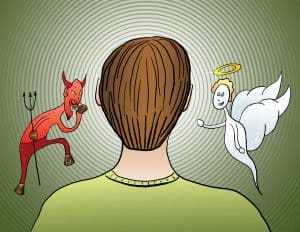
Competing Voices
Podcast: Play in new window | Download
Subscribe: Apple Podcasts | RSS
Schizophrenia is a serious and potentially deadly mental illness. Spiritual Schizophrenia is also very serious. Are you and I suffering from it? What exactly is it? Find out in today’s message.
 How often have you found yourself in a quandary, trying to decide between one voice in your head telling you one thing, and a different voice in your head telling you something else? I am convinced this is an ongoing occurrence for all people.
How often have you found yourself in a quandary, trying to decide between one voice in your head telling you one thing, and a different voice in your head telling you something else? I am convinced this is an ongoing occurrence for all people.
The Mayo Clinic website describes Schizophrenia as, “a serious mental disorder in which people interpret reality abnormally. Schizophrenia may result in some combination of hallucinations, delusions, and extremely disordered thinking.” It goes on to say, “People with schizophrenia require lifelong treatment. Early treatment may help get symptoms under control before serious complications develop and may help improve the long-term outlook.”
Though Schizophrenia is rare, affecting only about .32 percent of the population, one of its most common manifestations is hearing voices that don’t actually exist. These voices are hallucinations. My heart goes out to anyone who struggles with this or any mental health condition and to those who have loved ones who do. Today’s message is not intended to diminish the seriousness of this illness.
 With that said, I do believe that nearly 100 percent of the population suffers from some form of “spiritual schizophrenia”, therefore it needs to be addressed! I call it “spiritual Schizophrenia,” because we all hear strange and competing voices in our head when making decisions. The difference between it and Schizophrenia is the fact that the many voices we hear in our head actually exist.
With that said, I do believe that nearly 100 percent of the population suffers from some form of “spiritual schizophrenia”, therefore it needs to be addressed! I call it “spiritual Schizophrenia,” because we all hear strange and competing voices in our head when making decisions. The difference between it and Schizophrenia is the fact that the many voices we hear in our head actually exist.
Satan’s voice is real. He is a liar and a master illusionist. He tries to make everything seem different than it is. He attempts to create a hallucinogenic reality. He wants us to hear his voice and believe it’s God’s voice. He wants us to see good as bad, and bad as good. He wants us to feel condemned when God wants us to feel loved. It is delusional to believe that we can do something sinfully wrong and expect God to see it as something right. And, finally, it would be disordered thinking to believe we can modify the teachings of the Bible to accommodate our own modern-day whims and desires without serious consequences.
Jesus tells us in John 10:4-5 that He is the Good Shepherd. He says His sheep follow Him because they recognize His voice. He also says they will not follow a stranger because they do not recognize the stranger’s voice. Do we truly recognize Jesus’ voice or do we get tricked by the voice of the evil one?
 We are more likely to follow the Good Shepherd if we spend time learning to discern His voice. Knowing God’s voice is something most people struggle with. Many voices compete for our attention. We hear the voices on the news, the voices and opinions of our friends, the voices of our culture and the voices of our flesh, and the voices of evil. How do we distinguish God’s voice from these other voices?
We are more likely to follow the Good Shepherd if we spend time learning to discern His voice. Knowing God’s voice is something most people struggle with. Many voices compete for our attention. We hear the voices on the news, the voices and opinions of our friends, the voices of our culture and the voices of our flesh, and the voices of evil. How do we distinguish God’s voice from these other voices?
God speaks to us in many ways, but the one place He is always speaking to us is in our conscience. Deep within our conscience, we discover a law which we have not laid upon ourselves. This voice is always calling us to love and to do what is good and to avoid evil. We hear this voice with our heart not our ears. This voice, inscribed in our heart by God, is our sanctuary. There we are alone with God whose voice echoes in the depth of our being. It is an inescapable voice. God does not compel us to follow this voice. He gives us choice and free will to follow whatever voice we choose.
 Learning to recognize God’s voice is a lifelong process. The more we hear it the easier it is to recognize it again. Developing a good moral conscience takes time and effort. Our conscience bears witness to God’s authority, and it welcomes the commandments.
Learning to recognize God’s voice is a lifelong process. The more we hear it the easier it is to recognize it again. Developing a good moral conscience takes time and effort. Our conscience bears witness to God’s authority, and it welcomes the commandments.
In order to hear God speaking to us through our conscience, we need to be present to ourselves. This requires time for self-reflection and self-examination. If we have a well-formed conscience, we assume responsibility for our actions.
We hear competing voices both before and after sin. Unfortunately, sometimes we listen to the wrong voices and make the wrong decisions. Even with the best formed conscience, we still fall into sin. The moment we fall, the voices in our heads once again, compete for attention.
After a fall, God speaks to us through our conscience, He calls us to repentance. His is a message of forgiveness, mercy, and hope. His is a soothing, calming, and liberating voice. Through faith, prayer, and scripture we will learn to recognize God’s voice.
 Satan on the other hand, speaks with an accusing voice. After convincing us to sin, he speaks words of condemnation. He tells us we are worthless and trapped by our sinfulness.
Satan on the other hand, speaks with an accusing voice. After convincing us to sin, he speaks words of condemnation. He tells us we are worthless and trapped by our sinfulness.
Hopefully you can see that my comparison to Schizophrenia is more than just metaphorical. We all hear competing voices. Listening to the wrong voice can have deadly eternal consequences. Satan works hard to delude us. How is Satan speaking to you? How is God speaking to you? How do you discern one voice from the other?
Keep this in mind: hearing and acting on the right voice is never easy. Just like with schizophrenia, our spiritual life requires lifelong treatment, and early treatment will help us get our symptoms under control. Today is a great day to start.
Heavenly Father, I want to hear your voice more clearly. Speak to me Lord, I am listening. Amen!
AMDG
As always, I love to hear from you. You can email by clicking here. To share your thoughts with other readers, please use the comment section below.
Please take a couple minutes to watch the video about my new book. The book is available on this website and on Amazon.com. It is also NOW AVAILABLE IN SPANISH. Please be sure to like the video and to leave a review of the book on Amazon after you have read it. Thank you!
- What Is The Church’s Role In Society? - July 21, 2024
- The Thorn Remained - July 14, 2024
- The Confounding Nature Of Freedom - July 7, 2024

Love todays comparison of voices. How true in this struggling time of our lives.